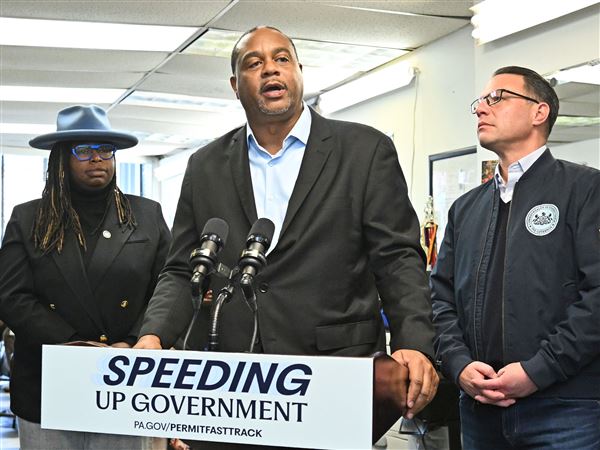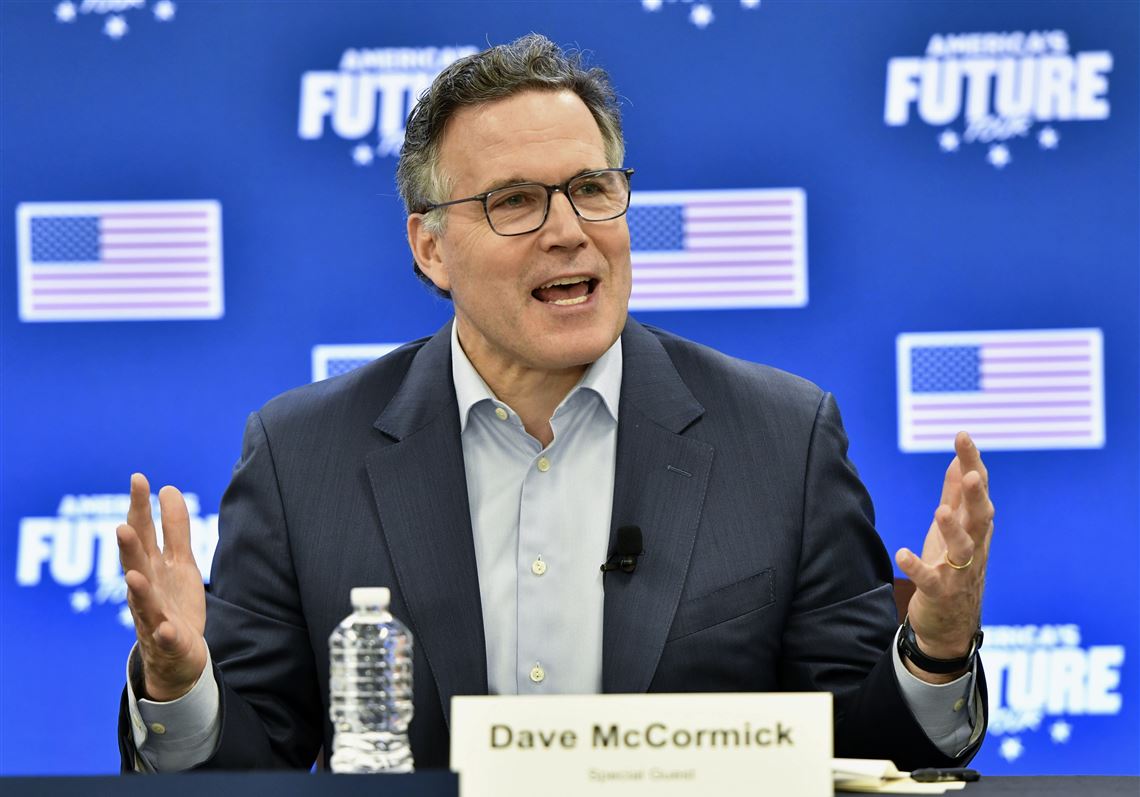WASHINGTON — David McCormick, the Republican former hedge fund CEO gunning for U.S. Sen. Bob Casey’s seat, wants the U.S. Department of Energy to pack up and move to Pittsburgh.
Mr. McCormick, who has criticized President Joe Biden and Mr. Casey on energy policy, argued that moving the department, which employs more than 14,000 federal workers, would place federal officials closer to energy production.
But when then-President Donald Trump moved two U.S. Department of Agriculture agencies out of Washington in 2019, the agencies suffered a severe brain drain as senior, experienced civil servants left their jobs, according to the Government Accountability Office, the investigative arm of Congress.
Mr. McCormick’s push to “change the culture in the capital,” as he described it Tuesday with Republican Oklahoma Gov. Kevin Stitt in Lancaster County, tracks arguments made by Mr. Trump, who has maligned nonpartisan civil service workers and experts, sought to replace them with political appointees, and pledged to dismantle the so-called “Deep State.”
“The regulators need to be in the places that they’re regulating,” Mr. McCormick said. “Washington shouldn’t be the center of power. We should move these things out into the country.”
Pennsylvania — second only to Texas in natural gas production in recent years — has become Ground Zero in efforts to wean the U.S. off fossil fuels and onto clean energy in an effort to combat climate change.
Twenty percent of the nation’s natural gas comes from the Keystone State, a key 2024 battleground where Mr. Biden and Mr. Casey hope to win over environmentalists and union workers in the state’s diverse energy sector, even as they move to a greater reliance on renewable power.
DOE and other federal agencies with “missions mostly outside of D.C.” should be moved across the U.S., Mr. McCormick said. In further plans to shake up Washington that his campaign unveiled Wednesday, Mr. McCormick also called for cutting regulations, giving Congress more oversight of federal agencies, selling federal buildings in Washington that do not have a full-time workforce, and dispensing with “misguided ideological agendas like diversity, equity and inclusion.”
Doreen Greenwald, president of the National Treasury Employees Union, which represents DOE workers in Washington, told the Post-Gazette that about 85% of federal employees already live and work outside the D.C. metro area.
The Energy Department’s footprint includes 17 National Laboratories and the National Energy Technology Laboratory in Pittsburgh, she added.
“Anyone who claims agencies are too concentrated in the nation's capital does not have all the facts,” she said. “Frontline federal employees, the civil servants who perform the day-to-day work of the agencies, are already immersed in the rural, urban and suburban communities they serve, in every state and territory.”
Mr. McCormick says the country can increase oil and gas production while advancing technologies like carbon capture and storage. He says the Biden administration incorrectly has made mitigating climate change the chief focus of energy policy.
Mr. Casey, a three-term incumbent, says the U.S. must ramp up the use of renewables to address climate change even while “recognizing and prioritizing the protection and creation of good-paying jobs in the energy sector.” He is one of several Democrats and Republicans who expressed concerns over the Biden administration’s temporary pause on building new facilities to export liquified natural gas.
In 2019, Mr. Trump, after Congress rejected his proposed Agriculture Department cuts, moved the National Institute of Food and Agriculture and the Economic Research Service from Washington to Kansas City.
The agencies reportedly lost half their staff after many experienced employees quit rather than uproot themselves and their families. The move temporarily undercut research efforts at the Economic Research Service and delayed grant approvals at the food and agriculture institute, according to the GAO’s 2022 report.
“We've lost hundreds, if not thousands of staff years of expertise," Laura Dodson, an ERS economist, told NPR in 2021.
Ms. Greenwald described the moves as “costly failures.”
Both agencies suffered dramatic losses in the number of Black employees and wound up with “a workforce composed of mostly recent hires with significantly less experience at the agencies than the previous workforce,” the GAO reported.
Benjamin Kail: bkail@post-gazette.com; @BenKail
First Published: May 15, 2024, 7:44 p.m.
Updated: May 16, 2024, 10:00 a.m.

















